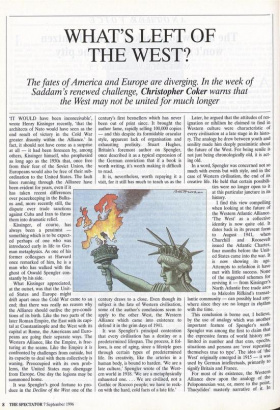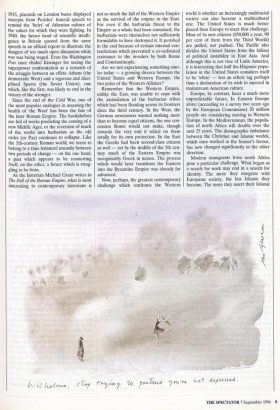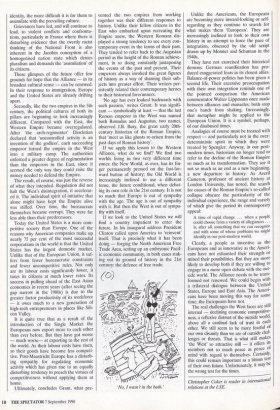WHAT'S LEFT OF THE WEST?
The fates of America and Europe are diverging. In the week of Saddam's renewed challenge, Christopher Coker warns that the West may not be united for much longer 'IT WOULD have been inconceivable', wrote Henry Kissinger recently, 'that the architects of Nato would have seen as the end result of victory in the Cold War greater disunity within the Alliance.' In fact, it should not have come as a surprise at all — it had been foreseen by, among others, Kissinger himself, who prophesied as long ago as the 1950s that, once free from their fear of the Soviet Union, the Europeans would also be free of their sub- ordination to the United States. The fault lines running through the Alliance have been evident for years, even if it has taken recent differences over peacekeeping in the Balka- ns and, more recently still, the dispute over trade sanctions against Cuba and Iran to throw them into dramatic relief.
Kissinger, of course, has always been a pessimist something which is to be expect- ed perhaps of one who was introduced early in life to Ger- man metaphysics. As one of his former colleagues at Harvard once remarked of him, he is a man who has walked with the ghost of Oswald Spengler con- stantly by his side.
What Kissinger appreciated, at the outset, was that the Unit- ed States and Europe might drift apart once the Cold War came to an end; that there was really no reason why the Alliance should outlive the pre-condi- tions of its birth. Like the two parts of the later Roman Empire, the East with its capi- tal at Constantinople and the West with its capital at Rome, the Americans and Euro- peans are going their separate ways. The Western Alliance, like the Empire, is frac- turing at the seams. Like the Empire it is confronted by challenges from outside, but its capacity to deal with them collectively is waning. Preoccupied with its own prob- lems, the United States may disengage from Europe. One day the legions may be summoned home.
It was Spengler's good fortune to pro- duce in the Decline of the West one of the
century's first bestsellers which has never been out of print since. It brought the author fame, rapidly selling 100,000 copies — and this despite its formidable oracular style, apparent lack of organisation and exhausting prolixity. Stuart Hughes, Britain's foremost author on Spengler, once described it as a typical expression of the German conviction that if a book is worth writing, it's worth making it difficult to read.
It is, nevertheless, worth repaying it a visit, for it still has much to teach us as the
century draws to a close. Even though its subject is the fate of Western civilisation, some of the author's conclusions seem to apply to the other West, the Western Alliance which came into existence to defend it in the grim days of 1941.
It was Spengler's principal contention that every civilisation has a destiny or a predetermined lifespan. The process, it fol- lows, is one of aging, since a lifestyle goes through certain types of predetermined life. Its creativity, like the arteries in a human body, is bound to harden. 'We are a late culture,' Spengler wrote of the West- ern world in 1918. 'We are a metaphysically exhausted one. .. . We are civilised, not a Gothic or Rococo people; we have to reck- on with the hard, cold facts of a late life.' Later, he argued that the attitudes of res- ignation or nihilism he claimed to find in Western culture were characteristic of every civilisation at a late stage in its histo- ry. The analogy he drew between youth and senility made him deeply pessimistic about the future of the West. For being senile is not just being chronologically old, it is act- ing old.
In a word, Spengler was concerned not so much with events but with style, and in the case of Western civilisation, the end of its creative life. He held that certain possibili- ties were no longer open to it at this particular juncture in its history.
I find this view compelling when looking at the future of the Western Atlantic Alliance. 'The West' as a collective identity is now quite old. It dates back in its present form to August 1941, when Churchill and Roosevelt issued the Atlantic Charter, four months before the Unit- ed States came into the war. It is now showing its age. Attempts to refashion it have met with little success. None of the suggested schemes for reviving it — from Kissinger's North Atlantic free trade area to Malcolm Rifkind's transat- lantic community — can possibly lead any- where since they are no longer in rhythm with the time.
This conclusion is borne out, I believe, by the use of analogy which was another important feature of Spengler's work. Spengler was among the first to claim that the expressive forms of world history are limited in number and that eras, epochs, situations and persons are 'ever repeating themselves true to type'. The idea of 'the West' originally emerged in 1915 — it was used by German intellectuals, primarily to signify Britain and France. For most of its existence, the Western Alliance drew upon the analogy of the Peloponnesian war, or, more to the point, Thucydides' masterly narrative of it. In
1915, placards on London buses displayed excerpts from Pericles' funeral speech to remind the 'heirs' of Athenian culture of the values for which they were fighting. In 1940, the future head of scientific intelli- gence in Britain quoted from the same speech in an official report to illustrate the dangers of too much open discussion while war was being waged. Even the Washington Post once chided Kissinger for seeing the superpower confrontation as a rematch of the struggle between an effete Athens (the democratic West) and a vigorous and disci- plined Sparta (the Soviet Union), one which, like the first, was likely to end in the victory of the stronger.
Since the end of the Cold War, one of the most popular analogies in assessing the health of 'the West' has been the fate of the later Roman Empire. The bookshelves are full of works predicting the coming of a new Middle Ages, or the reversion of much of the world into barbarism as the old order (or Pax) continues to collapse. Like the 5th-century Roman world, we seem to belong to a time balanced uneasily between two periods of change — on the one hand, a past which appears to be reasserting itself, on the other, a future which is strug- gling to be born.
As the historian Michael Grant writes in
• The Fall of the Roman Empire, what is most interesting to contemporary historians is
not so much the fall of the Western Empire as the survival of the empire in the East. For even if the barbarian threat to the Empire as a whole had been contained, the barbarians were themselves not sufficiently formidable to have destroyed it. It perished in the end because of certain internal con- tradictions which prevented a co-ordinated resistance to the invaders by both Rome and Constantinople.
Are we not experiencing something simi- lar today — a growing divorce between the United States and Western Europe, the two poles of the Western Alliance?
Remember that the Western Empire, unlike the East, was unable to cope with the assimilation of the barbarian tribes which had been flooding across its frontiers since the third century. In the West, the German newcomers wanted nothing more than to become equal citizens, the one con- cession Rome would not make, though towards the very end it relied on them totally for its own protection. In the East the Greeks had been second-class citizens as well — yet by the middle of the 5th cen- tury much of the Eastern Empire was recognisably Greek in nature. The process which would later transform the Eastern into the Byzantine Empire was already far advanced.
Now, perhaps, the greatest contemporary challenge which confronts the Western world is whether an increasingly multiracial society can also become a multicultural one. The United States is much better placed than Europe to meet that challenge. Most of its new citizens (850,000 a year, 90 per cent of them from the Third World) are pulled, not pushed. The Pacific also divides the United States from the fallout of political instability in East Asia. And although this is not true of Latin America, it is interesting that half the-Hispanic popu- lation in the United States considers itself to be 'white' — less an ethnic tag perhaps than a declaration of its wish to succeed in mainstream American culture.
Europe, by contrast, faces a much more unpredictable future. In Eastern Europe alone (according to a survey two years ago by the European Commission) 20 million people are considering moving to Western Europe. In the Mediterranean, the popula- tion of north Africa will double over the next 25 years. The demographic imbalance between the Christian and Islamic worlds, which once worked in the former's favour, has now changed significantly in the other direction.
Moslem immigrants from north Africa pose a particular challenge. What began as a search for work may end in a search for identity. The more they integrate with European society, the less Islamic they become. The more they assert their Islamic identity, the more difficult it is for them to assimilate with the prevailing culture.
Grievances have led, and will continue to lead, to violent conflicts and confronta- tions, particularly in France where there is disturbing evidence that the overtly racist thinking of the National Front is also inherent in the Jacobin conception of a homogenised nation state which denies pluralism and demands the 'assimilation' of its citizens.
These glimpses of the future offer few grounds for hope that the Alliance — in its broadest cultural sense — can be renewed. In their response to immigration, Europe and the United States are already drifting apart.
Secondly, like the two empires in the 5th century, the political cultures of both its pillars are beginning to look increasingly different. Compared with the East, the Western Empire became overregulated. After 'the arch-regimenter' Diocletian declared that 'uncontrolled activity is an invention of the godless', each succeeding emperor turned the empire in the West into a military camp. The authorities enforced a greater degree of regimentation than the emperors in the East, since it seemed the only way they could raise the money needed to defend the Empire.
The result, of course, was just the reverse of what they intended. Regulation did not halt the West's disintegration, it accelerat- ed it. The individual spirit of initiative that alone might have kept the Empire alive was stifled. Over time, the bureaucrats themselves became corrupt. They were far less able than their predecessors.
Today the United States is a more com- petitive society than Europe. One of the reasons why American companies make up nearly 75 per cent of the most successful corporations in the world is that the United States has the largest domestic market. Unlike that of the European Union, it suf- fers from fewer bureaucratic constraints and fewer uncompetitive rules. Not only are its labour costs significantly lower, it taxes its citizens at much lower rates. Its success in pulling ahead of the East Asian economies in recent years (after seeing the gap narrow in the 1980s) is due to the greater factor productivity of its workforce — it owes much to a new generation of high-tech entrepreneurs in places like Sili- con Valley.
It is quite true that as a result of the introduction of the Single Market the Europeans now export more to each other than ever before. But they have got worse — much worse— at exporting to the rest of the world. As their labour costs have risen, so their goods have become less competi- tive. Post-Maastricht Europe has a disturb- ing sympathy for regulating economic activity which has given rise to an equally disturbing tendency to preach the virtues of competitiveness without applying them at home.
Ultimately, concludes Grant, what pre-
vented the two empires from working together was their different responses to history. Unlike their fellow citizens in the East who embarked upon recreating the Empire anew, the Western Romans dis- played a strong tendency to see every con- temporary event in the terms of their past. They tended to refer back to the Augustan period as the height of the Roman achieve- ment, in so doing constantly juxtaposing the events of the past and present. Their emperors always invoked the great figures of history as a way of shaming their sub- jects into greater effort. Their writers per- sistently related their contemporary heroes to their historical forerunners.
`No age has ever looked backwards with such passion,' writes Grant. It was signifi- cant — symbolically at least — that the last Roman emperor in the West was named both Romulus and Augustus, two names, observed J.B. Bury, the great early 20th- century historian of the Roman Empire, that 'meet us like ghosts re-arisen from the past days of Roman history'.
If we apply this lesson to the Western Alliance, what do we find? We find two worlds living in two very different time zones: the New World, as ever, has its fin- ger permanently pressed on the fast-for- ward button of history; the Old World is increasingly inclined to use a different tense, the future conditional, when debat- ing its own role in the 21st century. It is not so much that Europe is out of sympathy with the age. The age is out of sympathy with it. But then the West is out of sympa- thy with itself.
If we look to the United States we will find a country impatient to enter the future. In his inaugural address President Clinton called upon America to 'reinvent' itself. That is precisely what it has been doing — forging the North American Free Trade Area, setting up an embryonic Pacif- ic economic community, in both cases stak- ing out its ground of history in the 21st century: the defence of free trade.
No, I wasn't in the bath.'
Unlike the Americans, the Europeans are becoming more inward-looking or self- regarding as they continue to search for what makes them 'European'. They arc increasingly inclined to look to their own history in an attempt to force the pace of integration, obsessed by the old script drawn up by Monnet and Schuman in the 1940s.
They have not exorcised their historical demons. German reunification has pro- duced exaggerated fears in its closest allies. Balance-of-power politics has been given a second life. Their excessive preoccupation with their own integration reminds one of the pointed comparison the American commentator Walter Lippmann once made between alliances and manacles: both stop one's hands from shaking. Increasingly, that metaphor might be applied to the European Union. It is a symbol, perhaps, of our disabused times.
Analogies of course must be treated with respect — and particularly not in the over- deterministic spirit in which they were treated by Spengler. Anyway, in our post- modern times, historians no longer tend to refer to the decline of the Roman Empire so much as its transformation. They see it not so much as an end as a new beginning, a new departure in history. As Averil Cameron, professor of ancient history at London University, has noted, the search for causes of the Roman Empire's so-called collapse obscure the particularity of the individual experience, the range and variety of which give the period its contemporary appeal:
A time of rapid change ... when a people could choose from a variety of allegiances . • • is, after all, something that we can recognise and with some of whose problems we might identify in our post-modern world.
Clearly, a people as inventive as the Europeans and as innovative as the Ameri- cans have not exhausted their strength or mined their possibilities. But they are more likely to develop both if they are willing to engage in a more open debate with the out- side world. The Alliance needs to be trans- formed not renewed. We could begin with a trilateral dialogue between the United States, Europe and East Asia. The Ameri- cans have been moving this way for some time; the Europeans have not.
The real challenges the West faces are still internal — declining economic competitive- ness, a reflexive distrust of the outside world, above all a cardinal lack of trust in each other. We still seem to be more fearful of our own disunity than we are of outside chal- lenges or threats. That is what still makes `the West' so attractive still — it offers its members not so much peace as peace of mind with regard to themselves. Certainly, this could remain important as a litmus test of their own future. Unfortunately, it may be the wrong test for the times.
Christopher Coker is reader in international relations at the LSE.




























































 Previous page
Previous page